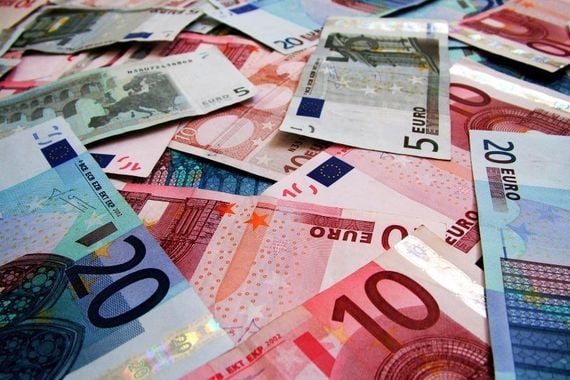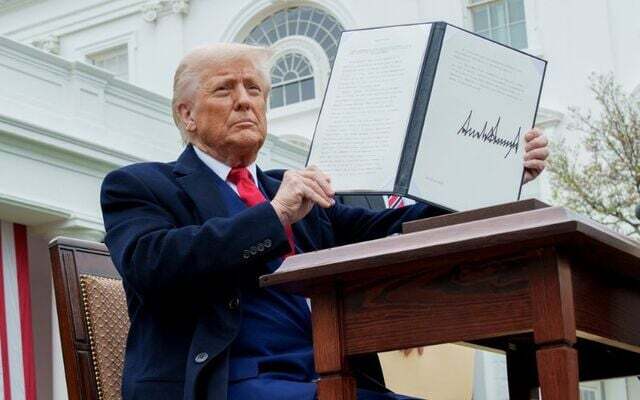Up to €6billion was wiped off Irish pensions this week as a result of US President Donald Trump’s tariffs, senior analysts have told Extra.ie.
However, amid turmoil in the global markets, pension holders are being told to ‘think long-term’ and remember that ‘volatility is just part of investing’.
As the country continues to grapple with the fallout from the 20% tariffs levied on EU imports this week, business leaders and representatives met with senior ministers at the Government Trade Forum.
Afterwards, a warning that workers’ hours would be cut back as soon as today was issued by the Irish Business and Employer Confederation(IBEC), with the tariffs set to immediately affect demand in the food and drink sector.
While the Government continues to push for negotiations ahead of retaliatory measures, Mr Trump yesterday vowed: ‘My policies will never change.’
Tánaiste Simon Harris warned that Ireland and the rest of the world are ‘going through a period of change’. ‘I don’t think this is a conversation that we kind of have for a few days and have a couple of meetings in Europe, and then everybody moves on.
'This is more of a fundamental shift in terms of the global trading environment.’
The FTSE 100 suffered its worst day in more than five years yesterday as the Trump trade war sparked a global meltdown in markets.
The UK’s blue-chip index was down 4.86% at the close after an extraordinary international bloodbath – with fears of a surge in inflation and worldwide recession. That was the biggest drop since March 27, 2020.
The sell-off deepened after China hit back by mirroring the US president’s 34% tariffs on its exports, in a grim sign of escalation.
As global markets took a €5.2 trillion hit this week, Wall Street giant JP Morgan warned: ‘There will be blood.’
But Trump struck a defiant tone on his Truth Social account saying his ‘policies will never change’ despite the turmoil in the markets.
Irish pension holders saw between €4billion and €6billion wiped off the value of their investments.
Aaron Killboy, a consultant with Lane Clark & Peacock a firm of financial, actuarial and business consultants, specialising in the areas of pensions, investment and insurance told Extra.ie: ‘Global stock markets are an important source of investment returns for Irish pension savers.
‘The announcement of US tariffs has threatened global trade and company profits causing global stocks to fall in value in recent weeks and days.
‘Overall, global stock markets have fallen in value by around 10% over the last week.
‘The value of all Irish DC pensions [estimated at €72billion at December 31, 2024] could reasonably have fallen by €4 billion – €6 billion over the same period.’

Getty Images
‘THINK LONG-TERM’
However, he also pointed out that most Irish pension investment strategies hold a range of investments including global stocks, bonds and property.
‘When global stocks perform poorly, it is often the case that other investments perform better. The precise impact on Irish pension savers depends on their investment fund choice and their stage in life.
‘Regardless of the short-term impact and news headlines, we always encourage pension savers to think long-term and remember that volatility is just part of investing.’
He added: ‘Volatility like we are currently seeing can often be a good reminder to check in on your pension.
‘We strongly recommend not taking knee-jerk reactions in response to the news headlines.
‘Instead, we would encourage people to discuss their circumstances with a qualified adviser.
‘If you look back three, five or ten years, most Irish pension investment strategies have delivered strong positive returns well above inflation.
‘Sometimes global stock markets can be a bumpy ride, but in the long-term they have handsomely rewarded patient pension savers that remain invested.’
IMPACT ON IRELAND
The immediate impact on the Irish labour market was confirmed by the chief executive of IBEC, Danny McCoy, after a meeting of the Labour Employment Economic Forum yesterday.
IBEC is the largest business representative group in the country.
Speaking briefly after the meeting, Mr McCoy said: ‘There is immediacy for firms this weekend, who know that their demand is likely to drop quite substantially and their workers will need to go on short-time working.’
Short-time working is where there is a temporary reduction in the number of ordinary hours of work owing to external factors such as slackness of trade, shortage of raw material or vagaries of weather.
Mr McCoy said: ‘Our experiences from both Covid-19 and Brexit was that it’s much better to have people to remain connected to their employer till this moment passes.
He added: ‘The reality of the market is that if your demand is likely to dry up, you have an excess supply of both the product and workers.’
ACTION PLAN
The meeting was convened in light of Mr Trump’s tariffs which are set to take effect from next week. It is understood that the Tánaiste announced an action plan on market diversification to be developed within six weeks.
Asked about Mr McCoy’s remarks, Mr Harris said there is already a ‘short-term employment scheme’ in place that was modified in terms of ensuring people could access support if they are put on reduced hours.
He also warned that Ireland and the EU are likely to face some forms of higher tariffs than we have been used to, even if a negotiated settlement with the United States was agreed.
‘If you’re asking me my honest opinion, though, are we back in an environment where there’s increased protectionism, increased trade barriers? That’s certainly what it looks like,’ he said.
‘I think we’d all be foolish to not take President Trump at his word, whether we agree or disagree. So far, he’s acting on the policy intensity as outlined.’
He also warned that other trade deals with places such as Canada and India would not replace the economic losses from the US.
Mr Harris said Mr Trump’s announcement on tariffs had delivered a ‘moment of chaos’.
‘I think we’ve seen economic turmoil in relation to the markets already in the United States, and I think that is a real vindication of what I and others have consistently said – that tariffs are bad news for the economy, they’re bad news for consumers, they’re bad news on this side of the Atlantic, but they’re also bad news on the other side of the Atlantic as well,’ the Tánaiste said.
Taoiseach Micheál Martin said Mr Trump’s criticism of a trade imbalance between the US and the EU only focused on the movement of goods and ‘ignored’ the services industry.
‘But services is the growth engine of modern economies, and the US enjoys a much, much better relationship on the services side with Europe, and indeed
with Ireland, than it does on the goods side. But that gets ignored,’ he said.
* This article was originally published on Extra.ie.




Comments